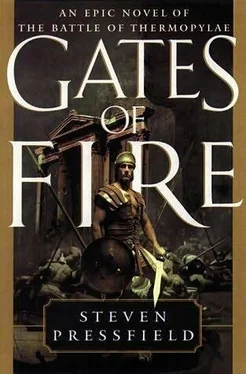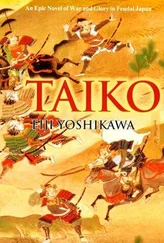Steven Pressfield - Gates of Fire - An Epic Novel of the Battle of Thermopylae
Здесь есть возможность читать онлайн «Steven Pressfield - Gates of Fire - An Epic Novel of the Battle of Thermopylae» весь текст электронной книги совершенно бесплатно (целиком полную версию без сокращений). В некоторых случаях можно слушать аудио, скачать через торрент в формате fb2 и присутствует краткое содержание. Жанр: Историческая проза, на английском языке. Описание произведения, (предисловие) а так же отзывы посетителей доступны на портале библиотеки ЛибКат.
- Название:Gates of Fire: An Epic Novel of the Battle of Thermopylae
- Автор:
- Жанр:
- Год:неизвестен
- ISBN:нет данных
- Рейтинг книги:3 / 5. Голосов: 1
-
Избранное:Добавить в избранное
- Отзывы:
-
Ваша оценка:
- 60
- 1
- 2
- 3
- 4
- 5
Gates of Fire: An Epic Novel of the Battle of Thermopylae: краткое содержание, описание и аннотация
Предлагаем к чтению аннотацию, описание, краткое содержание или предисловие (зависит от того, что написал сам автор книги «Gates of Fire: An Epic Novel of the Battle of Thermopylae»). Если вы не нашли необходимую информацию о книге — напишите в комментариях, мы постараемся отыскать её.
Gates of Fire: An Epic Novel of the Battle of Thermopylae — читать онлайн бесплатно полную книгу (весь текст) целиком
Ниже представлен текст книги, разбитый по страницам. Система сохранения места последней прочитанной страницы, позволяет с удобством читать онлайн бесплатно книгу «Gates of Fire: An Epic Novel of the Battle of Thermopylae», без необходимости каждый раз заново искать на чём Вы остановились. Поставьте закладку, и сможете в любой момент перейти на страницу, на которой закончили чтение.
Интервал:
Закладка:
With a cry that curdled the blood, they did.
I saw Olympieus pause bareheaded and stare at the foe-strewn earth about him, himself overcome by the scale of the carnage. Then he reseated his helmet; his face vanished beneath the bloodWasted bronze and, summoning his squire, he strode back to the slaughter.
To the rear of the routed lancers stood their brothers, the Median archers. These were drawn up in still-ordered ranks, twenty deep, each bowman in station behind a body-height shield of wicker, its base anchored to the earth with spikes of iron. A no-man's-land of a hundred feet separated the Spartans from this wall of bowmen. The foe now began firing directly into their own lancers, the last pockets of the valiant who yet grappled with the Lakedaemonian advance.
The Medes were shooting their own men in the back.
They didn't care if they slew ten of their brothers, if one lucky bolt could nail a Spartan.
Of all the moments of supreme valor which unfolded throughout this long grisly day, that which the allies upon the Wall now beheld surpassed all, nor could any who witnessed it place any sight beneath heaven alongside it as equal. As the Spartan front routed the last remaining lancers, its forerankers emerged into the open, exposed to what was now the nearly point-blank fire of the Median archers. Leoni-das himself, at his age having survived a melee of murder whose physical expenditure alone would have pressed beyond the limits of endurance even the stoutest youth in his prime, yet summoned the steel to stride to the fore, shouting the order to form up and advance. This command the Lake-daemonians obeyed, if not with the precision of the parade ground, then with a discipline and order beyond imagining under the circumstances. Before the Medes had time to loose their second broadside, they found themselves face-to-face with a front of sixty-plus shields, the lambdas of Lakedaemon obscured beneath horrific layers of mud, gore and blood which ran in rivers down the bronze and dripped from the leather aprons pended beneath the aspides, the oxhide skirts which protected the warriors' legs from precisely the fusillade into which they now advanced. Heavy bronze greaves defended the calves; above each shield rim extended only the armored crowns of the helmets, eye slits alone exposed, while overtopping these waved the front-to-back horsehair plumes of the warriors and the transverse crests of the officers.
The wall of bronze and crimson advanced into the Median fire. Cane arrows ripped with murderous velocity into the Spartan lines. Possessed by terror, an archer will always shoot high; you could hear these overshot shafts hailing and clattering as they ripped at crown height past the Spartan foreranks and tore into the forest of spears held at the vertical; then the missiles tumbled, spent, among the armored ranks. Bronzehead bolts caromed off bronze-faced shields with a sound like a hammer on an anvil, their furious drumming punctuated by the concussive thwock of a dead-on shot penetrating metal and oak so the head lanced through the shield like a nail piercing a board.
I myself had planted shoulder and spine into the back of Medon, senior of the Deukalion mess, whose station of honor stood rearmost of the first file in Dienekes' platoon. The pipers were hunkered immediately in the lee of the formation, unarmed and unarmored, crouching for cover as close to the heels of the rear-rankers as they could without tripping them, all the while summoning breath to skirl out the shrill aulos's beat. The densely packed ranks advanced not in a mobbed disordered charge shouting like savages, but dead silent, sober, almost stately, with a dread deliberateness in time to the pipers' keening wail. Between the fighting fronts, the hundredfoot gap had narrowed to sixty. Now the Medes' fire redoubled. You could hear the orders bawled by their officers and feel the air itself vibrate as the ranks of the foe loosed their fusillades in ever more furious succession.
A single arrow blazing past one's ear can turn the knees to jelly; the honed warhead seems to scream with malevolence, the hurdling weight of the shaft driving its death-dealing cargo; then come the fletched feathers communicating by their silent shriek the homicidal intent of the enemy. A hundred arrows make a different sound. Now the air seems to thicken, to become dense, incandescent; it vibrates like a solid. The warrior feels encapsulated as in a corridor of living steel; reality shrinks to the zone of murder in which he finds himself imprisoned; the sky itself cannot be glimpsed nor even remembered.
Now come a thousand arrows. The sound is like a wall. There is no space within, no interval of haven. Solid as a mountain, impenetrable; it sings with death. And when those arrows are launched not skyward in long-range arcing trajectory to beat upon the target driven by the weight of their own fall, but instead are fired point-blank, dead flush from the chute of the bowman's grip, so that their flight is level, flat, loosed at such velocity and at such close range that the archer does not trouble even to calculate drop into his targeting equation; this is the rain of iron, hellfire at its purest.
Into this the Spartans advanced. They were told later by the allies observing from the Wall that at this instant, as the spears of the Spartans' front ranks lowered in unison from the vertical plane of advance into the leveled position of attack and the serried phalanx lengthened stride to assault the foe at the double; at this moment, His Majesty, looking on, had leapt to his feet in terror for his army.
The Spartans knew how to attack wicker. They had practiced against it beneath the oaks on the field of Otona, in the countless repetitions when we squires and helots took station with practice shields, planted our heels and braced with all our strength, awaiting the massed shock of their assault. The Spartans knew the spear was worthless against the interlat-ticed staves; its shaft penetrated the wicker only to become imprisoned and impossible to extract. Likewise the thrust or slash of the xiphos, which caromed off as if striking iron. The enemy line must be struck, shock troop style, and overwhelmed, bowled over; it had to be hit so hard and with such concentrated force that its front-rankers caved and toppled, one rank backward upon another, like plateware in a cabinet when the earth quakes.
This is precisely what happened. The Median archers were drawn up not in a massed square front-to-back with each warrior reinforcing his comrades against the shock of assault, but honeycombed in alternating fronts, each rank at the shoulder of the one before it, so that the bowmen in the second could fire in the gaps left by the first, and on in this fashion rearward throughout the formation.
Moreover the enemy ranks were not stacked with the massed compaction of the Spartan phalanx.
There was a void, an interval between ranks dictated by the physical demands of the bow. The result of this was precisely what the Lakedaemonians expected: the forerank of the enemy collapsed immediately as the first shock hit it; the body-length shields seemed to implode rearward, their anchoring spikes rooted slinging from the earth like tent pins in a gale. The forerank archers were literally bowled off their feet, their wall-like shields caving in upon them like fortress redoubts under the assault of the ram. The Spartan advance ran right over them, and the second rank, and the third. The mob of enemy mid-rankers, urged on by their officers, sought desperately to dig in and hold. Closed breast-to-breast with the Spartan shock troops, the foe's bows were useless. They flung them aside, fighting with their belt scimitars. I saw an entire front of them, shieldless, slashing wildly with a blade in each hand. The valor of individual Medes was beyond question, but their light hacking blades were harmless as toys; against the massed wall of Spartan armor, they might as well have been defending themselves with reeds or fennel stalks.
Читать дальшеИнтервал:
Закладка:
Похожие книги на «Gates of Fire: An Epic Novel of the Battle of Thermopylae»
Представляем Вашему вниманию похожие книги на «Gates of Fire: An Epic Novel of the Battle of Thermopylae» списком для выбора. Мы отобрали схожую по названию и смыслу литературу в надежде предоставить читателям больше вариантов отыскать новые, интересные, ещё непрочитанные произведения.
Обсуждение, отзывы о книге «Gates of Fire: An Epic Novel of the Battle of Thermopylae» и просто собственные мнения читателей. Оставьте ваши комментарии, напишите, что Вы думаете о произведении, его смысле или главных героях. Укажите что конкретно понравилось, а что нет, и почему Вы так считаете.












